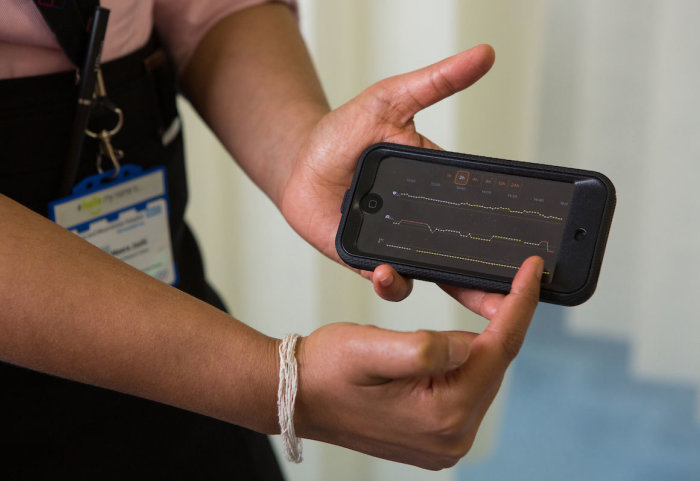Wearable sensor trialled for remote COVID-19 monitoring

CW+ and Mile91/Ben Langdon
Wearable technology to remotely detect signs that a patient’s condition is worsening is being trialled to support the ongoing COVID-19 response.
Led by Imperial College London, in partnership with NHS organisations in northwest London, the sensor is being used to monitor people in quarantine at a special NHS facility near Heathrow airport, for example travellers from abroad or those wishing to travel to return home.
The wearable patch, developed by Sensium, is already being trialled in hospital settings to spot early warning signs of sepsis. The lightweight device attaches to an individual’s chest and records their vital signs including breathing rate and temperature every two minutes. Usually these measurements would need to be taken manually by healthcare staff and would be carried out several hours apart.
The data collected by the sensor is automatically analysed by a computer algorithm and can be seen by a medical team, alerting them when a person’s health may be deteriorating.
Now researchers at Imperial’s Institute of Global Health Innovation (IGHI) are testing whether this could benefit both individuals in quarantine and staff working in these new NHS facilities, by enabling close clinical monitoring that would not otherwise be possible due to safeguarding to minimise coronavirus spread.
Doing so could not only allow doctors and nurses to respond quicker to patients’ needs and transfer them from the community to hospital where necessary, but also potentially reduce exposure of healthcare staff to the coronavirus. Reducing contact between individuals in quarantine and health workers would also limit the use of personal protective equipment (PPE) which is in short supply.
The trial will also seek to identify those who are worst affected by COVID-19 and may need hospital care.
Dr Meera Joshi, research lead at IGHI, said: “I am keen to apply what I have learned in my PhD on wearable sensors to help in the ongoing COVID-19 response. I am grateful to CWplus for their generous funding, Professor Ara Darzi, Dr Sadia Khan, Mr Hutan Ashrafian and Sensium for their ongoing support. It’s great to be a part of this collaborative effort for a global crisis.”
The trial, supported by Sensium and CW+, launched this week and has already begun recruiting participants. The data collection and analysis are being led by IGHI Clinical Research Fellow Dr Fahad Iqbal. The technology is initially being trialled in the UK with a view to expanding the work internationally.
Article text (excluding photos or graphics) © Imperial College London.
Photos and graphics subject to third party copyright used with permission or © Imperial College London.
Reporter
Justine Alford
Institute of Global Health Innovation